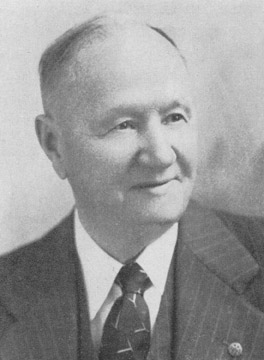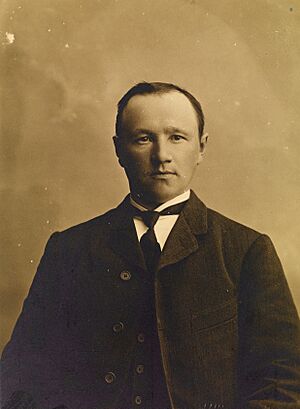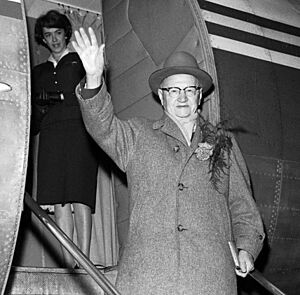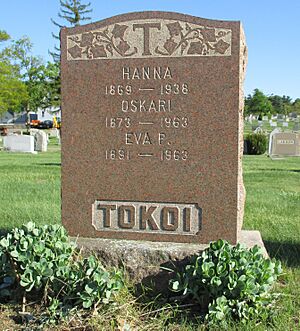Oskari Tokoi facts for kids
Quick facts for kids
Oskari Tokoi
|
|
|---|---|
 |
|
| Chairman of the Senate of Finland | |
| In office March 26, 1917 – September 8, 1917 |
|
| Preceded by | Mihail Borovitinov |
| Succeeded by | Eemil Nestor Setälä |
| Personal details | |
| Born | May 15, 1873 Kannus, Finland |
| Died | April 4, 1963 (aged 89) Leominster, Massachusetts, United States |
| Political party | Social Democratic Party |
Antti Oskari Tokoi (born May 15, 1873 – died April 4, 1963) was an important Finnish socialist leader. He was a key figure in the Social Democratic Party of Finland. In 1917, Tokoi became the Chairman of the Senate of Finland. This made him the world's first social democratic leader of a government.
During the short-lived Revolution of 1918, Tokoi played a leading role in the revolutionary government. After these events, Tokoi moved to the United States. There, he worked for a long time as the editor of Raivaaja (The Pioneer). This was a newspaper for the Finnish Socialist Federation.
Contents
Oskari Tokoi's Life and Political Journey
Early Life and Moving to America
Oskari Tokoi was born as Antti Oskari Hirvi on May 15, 1873. His birthplace was Kannus, in the Central Ostrobothnia region of Finland. His family later took the name "Tokoi" from a farm his grandfather bought. His father, Kalle, was a farmer and traded horses.
Life was hard financially. In 1878, Tokoi's uncle moved to the United States. This inspired his father to follow in 1881. Oskari's father was one of the few people in the area who could read. He wanted Oskari to learn too. So, Oskari went to grammar school in a nearby village. He was a very good student. However, his parents did not let him continue school after four years. He never went to a formal school again.
Oskari's father came back to Finland in January 1887. His brother had taken over the family farm. So, Oskari's father went back to trading horses. But he died just three months later at age 33. For the next four years, Tokoi worked on farms for others and for his uncle. He and his uncle did not get along well.
After a difficult incident, the relationship with his uncle got worse. In January 1891, 17-year-old Oskari decided to leave the farm. He moved to America to start a new part of his life.
First Time in America
Oskari Tokoi had a tough journey across the sea in early 1891. He arrived in the United States and went to the coal mines in Wyoming. His father had worked there before him. Tokoi worked in several coal and metal mines in Wyoming, Colorado, and the Dakota Territory. He joined the Western Federation of Miners, a union for mine workers.
Later, he lost his job in the mines. This made him travel through the Midwest looking for work. In 1900, Tokoi returned to Finland. He then worked as a farmer and a merchant.
Finnish Political Career Begins
Tokoi started getting involved in politics in 1901. He joined a movement against Russia's influence on Finland. Because of his actions, he was chosen as the chairman of the workers' association in Kannus in 1905.
In 1907, Tokoi was elected to the Finnish parliament, called the Eduskunta. He represented the Social Democrats. From 1912 to 1917, he led the Finnish Trade Union Federation. In 1913, Tokoi became the speaker of the Eduskunta. Then, in 1917, he became the head of the Senate of Finland.
On March 1, 1918, a treaty was signed between the socialist governments of Russia and Finland. This happened in Saint Petersburg. Vladimir Lenin and Joseph Stalin signed for Russia. Edvard Gylling and Oskari Tokoi signed for Finland.
During the Finnish Civil War, Tokoi supported the Reds. He worked as the "commissar in charge of provisions," which meant he was like a minister for supplies. After the war, he feared punishment from the winning Whites. So, he fled to Russia.
Moving Away for Good
In 1919 and 1920, Tokoi advised the Murmansk Legion. This group was set up by the British against Finnish nationalists. These nationalists were planning military trips into British-controlled parts of Russia. The Bolsheviks did not approve of this effort. So, Tokoi had to leave again.
Tokoi first went to England. From there, he traveled to Canada. He stayed in Canada for a year and farmed in the Timiskaming District. On November 21, 1921, Tokoi returned to the United States. He entered through Sault Ste. Marie, Michigan, using his passport from England.
He went to a Finnish-American community in Fitchburg, Massachusetts. There, he was briefly held and questioned. He was almost sent back to Finland. But in April 1922, the Department of Labor canceled the order. This allowed Tokoi to stay in America.
After his release, Tokoi became an editor at the Finnish newspaper Raivaaja (The Pioneer). During the Winter War of 1939–1940, Tokoi spoke out actively to support Finland.
In 1944, the Finnish Parliament passed a special law called Lex Tokoi. This law cleared Tokoi of all charges related to the Finnish Civil War. After World War II, he helped organize aid for Finland among Finnish-Americans. He visited Finland several times in 1949, 1953, 1957, and 1958. In 1957, he attended the 50th anniversary of the Eduskunta.
Death and Lasting Impact
Oskari Tokoi passed away on April 4, 1963. He was buried in Forest Hill Cemetery in Fitchburg, Massachusetts. In July 1970, Finland's President Kekkonen visited Forest Hill Cemetery. He stopped at Oskari Tokoi's grave to pay his respects.
Important Political Roles
- Member of Parliament of Finland—1907 to 1918
- Speaker of the Parliament of Finland—1913
- Chairman of the Senate of Finland—1917
Memorials and Tributes
- Tokoinranta, a quay (a landing place for ships) in Helsinki, is named after him.
- The Oskari Tokoi Memorial is located at the Finnish Center in Saima Park in Fitchburg, Massachusetts.
- A sculpture by Wäinö Aaltonen honoring Tokoi is at the Social Democratic Party headquarters in Helsinki.
- On his 100th birthday, a memorial was placed in Kannus, Finland, to honor Oskari Tokoi.
 | Isaac Myers |
 | D. Hamilton Jackson |
 | A. Philip Randolph |




